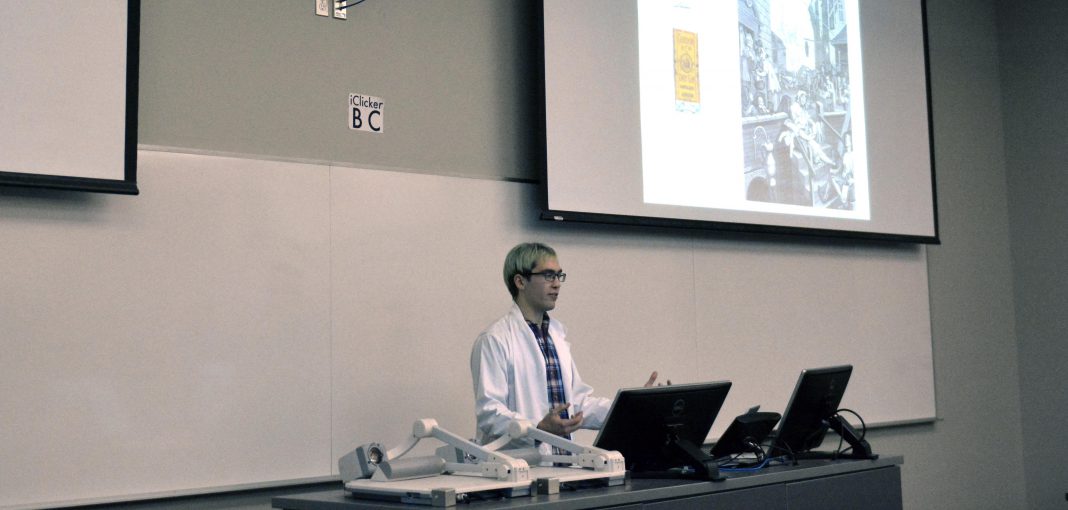Did you hear oxygen and potassium went on a date? It went OK.
It was with this joke that Robert Gooding-Townsend opened his talk on comedy in science Jan. 20. As a graduate of the University of Waterloo’s Knowledge Integration (KI) program, it seemed only fitting for Gooding-Townsend — now a Master’s student in Applied Mathematics at UW — to speak at the most recent KI seminar series — a weekly lecture featuring guest speakers involved in provoking transdisciplinary work. Joining him was Dr. Nathaniel Barr, a professor of creativity and creative thinking at Sheridan College, perhaps best known for his contribution to the well-publicized scholarly paper “On the reception and detection of pseudo-profound bullshit.”
What role does comedy and humour play in science? How can it be harnessed creatively to spark productive discourse? These were the big picture questions addressed by Gooding-Townsend and Barr on Friday. As winners of the Festival of Bad ad Hoc Hypotheses (BAHFest) and the Ig Nobel Peace Prize, respectively, who better to stir up the dialogue than these two?
Gooding-Townsend began with an explanation of science comedy, describing it as “comedy by or about scientists”. It’s a vague definition, he admitted, but it isn’t something that needs to be clearly delineated. The important thing is that it’s humour that depends on some sort of technical knowledge. As an example, he brought up the immensely popular online webcomic xkcd, aptly tag-lined as a “webcomic of romance, sarcasm, math, and language”. Other domains that scientific comedy can take afoot in are viral videos (“Entropic Time”, a parody of Billy Joel’s “The Longest Time”) and, of course, in actual academic works themselves (for example, through silly little jokes that scientists insert into the marginalia of their papers to entertain themselves).
On that note, Gooding-Townsend then took the time Barr to the stage.
Barr knows a little something about humour in serious academia. Just last year, while working as a cognitive psychology postdoc at UW, Barr, alongside then-PhD student Gordon Pennycook and his supervisors Dr. Derek Koehler and Dr. Jonathan Fugelsang, published a journal article that earned him and his teammates worldwide recognition: “On the reception and detection of pseudo-profound bullshit.” If you found yourself chortling at the title, you’re not the only one; the paper attracted not only widespread media attention (including coverage in The Wall Street Journal, TIME, Forbes and, most importantly, the front page of Reddit), but it also landed the group of researchers the 2016 Ig Nobel Peace Prize, a parody of the actual Nobel Prize awards honouring scientific achievements that “first make people laugh, and then make them think.”
And that’s exactly what they did. In a brief but highly entertaining presentation, Barr powered through the story of the paper, from its origins over beers at the Grad House to its main findings (that those with less analytical thinking styles are more prone to perceiving nonsense computer-generated phrases as “profound”), to their meteoric explosion in the popular press (including acknowledgement from Richard Dawkins!).
Most importantly, however, was the emphasis this wasn’t just some joke. Barr pointed out how the article already has 21 citations, indicative of the serious academic traction. Their research has imminent real-world implications, including insight into how pervasive bullshit can disseminate within a society – for example, through misleading clickbait content and divisive rhetoric from politicians. Had they replaced “bullshit” with, say, “nonsense”, would it have been so popular? Probably not, according to Barr.
Following Barr’s presentation, Gooding-Townsend returned to the stage to talk about his own experience lighting up the world with his scientific humour. Donning a lab coat and goggles, he launched into a thoroughly entertaining proposal that earned him first place at BAHFest MIT 2016, an annual competition celebrating “well-argued and thoroughly researched but completely incorrect scientific theories”. His hypothesis? That the rapid evolution of human cranial size occurred due to our increasing need to metabolize more and more alcohol — he called it the “social lubricant intelligence hypothesis”. Brilliant.
Gooding-Townsend then opened the forum to discussion and questions. What’s so great about science comedy anyway? As an enterprise generally considered serious and impenetrable by the masses, injecting a bit of humour into science can do a great deal for connecting with audiences. Not only does it make science more accessible for laypeople, it also makes it more fun. Like a gateway drug, science comedy hooks people with some cheap laughs, then drags them down a rabbit hole into thoughtfully engaging in the things that matter. As Isaac Asimov once said, “The most exciting phrase to hear in science, the one that heralds new discoveries, is not ‘Eureka!’, but ‘That’s funny…’”




























